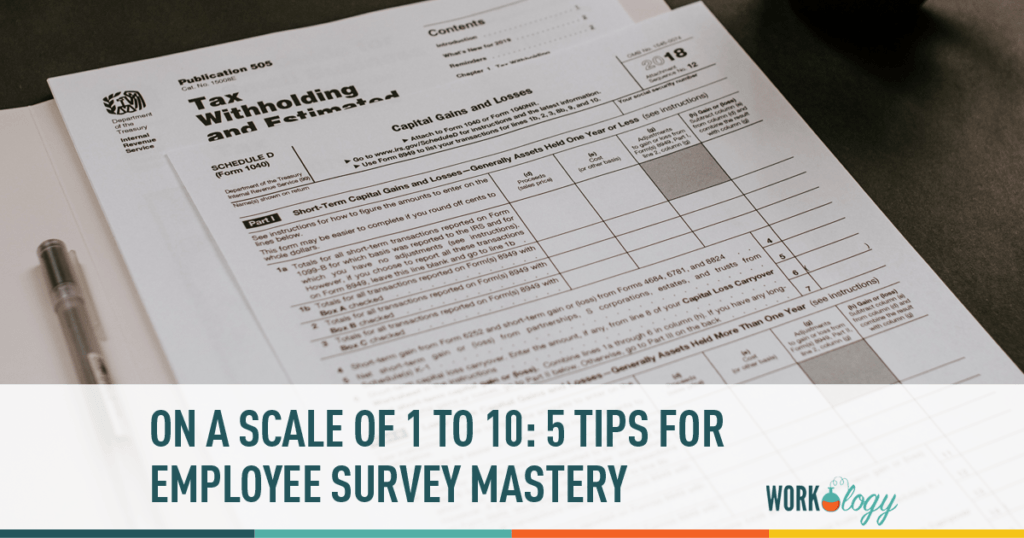5:Tips for Employee Survey Mastery
If asked to rate your love for employee surveys on a scale of 1 to 10, the difference between a perfect score and not even answering can be familiar. One of the most valuable tools available to an HR professional when determining the mindset of our employees is the employee survey. Easily created, but hard to perfect, this insightful research method sheds light on what we do effectively and where we need to make an extra effort for improvement. Employee survey results can assist us in adding real value to our organization’s decision-making, as well as reveal what is at the heart of our employees’ motivations.
Options: Trust the Professionals
There are a wide variety of out-of-the-box survey solutions available for purchase, so if your company doesn’t currently have a license for a specific program, spend some time researching the available options to find one that fits your allotted budget. At Cancer Treatment Centers of America® (CTCA), we are currently using the Aon Hewitt Engagement Survey enterprise-wide, which provides all six of our Talent departments across the US with a great mix of questions that let us ask about everything from employee well-being to engagement.
While it can be tempting to create your own survey questionnaire, I highly recommend taking advantage of an existing survey structure and methodology. It might seem like you are just asking basic questions, but the marketing research field has spent decades perfecting how to ask questions in a way that does not lead or influence those being surveyed. These programs are easy to customize and distribute and are definitely worth the investment. In most programs, there will be a few open-ended questions that you will have full control over. These are great for asking questions about specific programs or corporate policies at your organization. Ultimately, these programs will also support the need for anonymity in the responses, which is essential for obtaining accurate information.
Reading the Results
Once you receive the results, it is time to parse the information to identify strengths as well as areas that require improvement. For most of the survey programs available, the survey results are provided as a report, indicating the general feelings of employees on a given subject. This is fairly straightforward, but there are a few key points to keep in mind, including:
How often have you surveyed your employees?
- If you are surveying your employees too often about the same subject, you risk survey fatigue; if you would like to garner regular feedback, keep your surveys short and minimize the number of open-ended questions. Otherwise, I suggest a cadence of one or, at most, two company-wide surveys annually.
Was your survey immediately following a major (good or bad) event at your company?
- If your plan is to gauge employees’ reactions to an event, prepare to receive slightly more emotional responses; the survey data can uncover how effective your communication strategy is at explaining the importance of certain decisions and the impact on employees.
Have you had a hiring push lately with many new employees?
- If you have a lot of new folks joining your teams, they may be more apt to either respond very positively or they may not respond at all due to a lack of knowledge about your company and its activities. To avoid skewing your responses, do not be afraid to engage new employees in advance of the survey to encourage them to share their fresh perspectives on the organization.
What is the total response rate?
- If your response rate is low, this can be indicative of either survey fatigue or, in the worst-case scenario, apathy. Apathy can have many causes. If your employees are concerned about maintaining anonymity and/or believe that their voice does not matter this may negatively impact the survey response rate. By reaching out in advance of surveys through a pre-survey email and a coordinated effort by management to speak to employees individually and at the team level, you can take the lead and indicate how information will be collected, reported, and used. This will inform responders that you encourage them to be honest and that you are providing them with a safe platform to share their feedback.
What are the themes surfaced from the open-ended survey questions?
- If your responses are positive, what are they telling you that you are doing right and how can you expand those strengths to other programs/activities? If the responses cite team-specific complaints, you may choose to engage your managers to improve communication or to institute a new policy; if the complaints are company-wide, then consider doing the same with your corporate leadership.
Give Back on Your Feedback
It is important to treat what you have learned and the feedback that was provided as a gift in its own right. Simply collecting information and understanding it isn’t enough: you must be willing to share the results of the survey with your employees and engage them to help the organization address pain points, share best practices and continuously improve.
The single most important point I want you to take away from this post is:
If you ask for feedback, you must share the unvarnished feedback, use it to drive meaningful, visible change and let your people know that their input made all the difference.
Solicited (or unsolicited) feedback is a way for your employees to give your organization deep insights. As an HR leader, you should seek to design a continuous loop of input, feedback and meaningful action that should extend into your day-to-day operations. The best way to fight apathy among those who respond is by demonstrating your willingness to listen and work to incorporate your employees’ feedback into your corporate policy. Take action with the insights that you receive and keep the conversation going!








